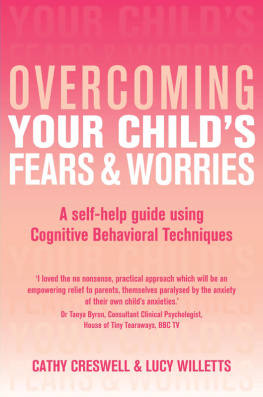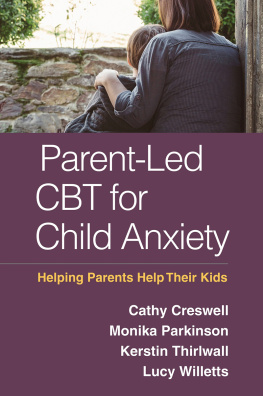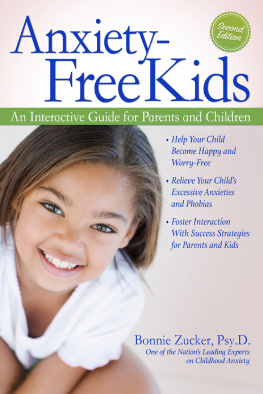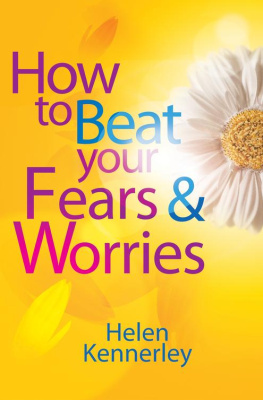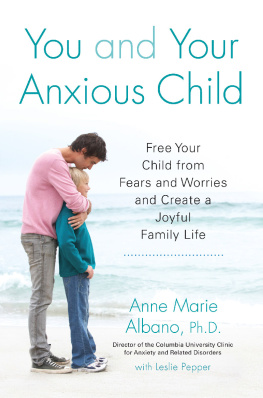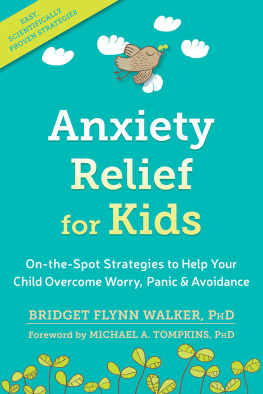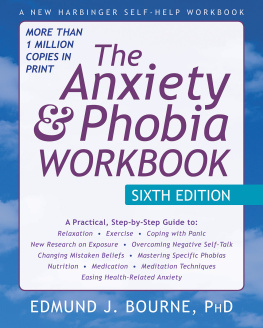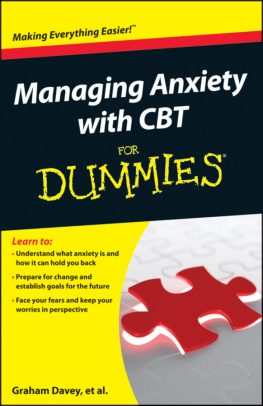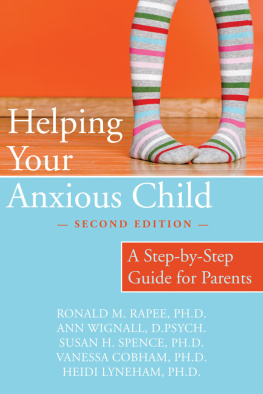CATHY CRESWELL is a clinical psychologist and research fellow at the University of Reading. Since her clinical training, Cathy has worked with children and families in a range of mental health settings such as GP practices, hospitals and a child and adolescent mental health team. She has completed a PhD on the development of anxious thinking styles in children and a diploma in cognitive behavioral therapies for children and adolescents. She has been based at the University of Reading for three years where she conducts research and provides treatment for children with anxiety problems and for their families. She lives in Oxfordshire with her partner, Colin, and son, Joe.
LUCY WILLETTS is a clinical psychologist who has worked for the NHS in Reading since completing her clinical training 11 years ago. Lucy currently spends part of her time in the Department of Paediatrics at the Royal Berkshire Hospital, working with children with physical health problems. The rest of her time is spent running the Child Anxiety Disorders Research Clinic at the University of Reading, which she set up five years ago. The joint NHS/university clinic offers assessment and treatment to children and adolescents with a range of anxiety problems. Lucy has recently completed a PhD investigating the role of family in the development of childhood anxiety. Lucy lives in Berkshire with her husband, Andrew, and sons, Joslin and Charlie.
Praise for Overcoming Your Childs Fears and Worries
This excellent book is very well written and is essential reading for any parent who is concerned that their child is anxious. At the outset it provides information to help parents understand the nature of childrens fears or concerns, how they develop, and why they persist. It also helps parents to distinguish between what are common and ordinary fears and worries, and what kinds of worries might require some form of parental intervention. The book reads very easily and parents would do well to have a copy on their bookshelves to enable them to dip into it at times of stress.
Alan Stein, Professor of Child and Adolescent Psychiatry,
University of Oxford
I think Cathy Creswell and Lucy Willetts should be congratulated on writing such an accessible yet comprehensive and informative book. They pitch the book at the right level for parents and professionals alike compassionate and non-judgemental without skimping on the hard facts of the biological, psychological and social realities of these issues. I read it in one sitting and felt I had learnt a lot by the end. I loved the no nonsense, practical approach that will be an empowering relief to parents, themselves paralysed by the anxiety of their own childs anxieties. Feel a bit jealous that I didnt write it myself!
Dr Tanya Byron, Consultant Clinical Psychologist,
House of Tiny Tearaways, BBC TV
This book is a very thorough and detailed practical guide which will be very useful for both therapists working with children with fear and worries, as well as families who are able to use this book as a self-help treatment guide.
Dr Penny Titman, Consultant Clinical Psychologist,
Great Ormond Street Hospital
Being frightened and worrying too much of the time gets in the way of children and teenagers playing, having fun together, and getting on with their education. Cathy Creswell and Lucy Willetts have done a great job in making this self-help guide for children, teenagers and parents; explaining in a clear and practical way how therapy is done and how it can be done by families themselves.
Professor Derek Bolton, Anxiety Clinic for Children and Adolescents, South London and Maudsley NHS Trust
Learning to live with our childrens anxiety is difficult. How do we balance our instincts with conflicting advice from different people? How do we know when its a natural and helpful life experience or when it is less helpful? And how do we know when its our role as parents to step in? In answering these questions, this book is a breath of fresh air and a godsend for any parent whose child is anxious.
Whilst anxiety can be a long-standing problem if untreated, this book instills hope that the right management can help. A sense of collaboration between the authors and the reader, and the parent and their child, is instilled from the word go. It covers everything I would want to see in a book of its kind and more, and helps people to move from a position of powerlessness to the position that something positive can be done.
Dr Nicky Dummett, Consultant Child and Adolescent Psychiatrist, Leeds and Chair of BABCP Children, Adolescents and Families Special Interest Branch
This book provides a very helpful framework for supporting parents to adopt a non-judgemental and caring response to problems [such as severe anxiety]. At its centre it asks parents not to assume they know what their child is experiencing and to engage them in respectful and genuinely curious conversations about their difficulties. The book is packed with lots of examples and through these examples the authors clearly convey that their enthusiasm for this approach is tempered by realism, acceptance and an appreciation of the worries and terrors of childhood.
Dr Peter Fuggle, Consultant Clinical Psychologist,
Child and Family Consultation Service,
The Northern Health Centre, London
One of the strengths of this very informative book is the accessibility of the writing style throughout. Even when describing complex concepts the authors do not deviate from this commitment to clarity.
There is a refreshing sense of optimism about the work which I would think would increase parental confidence in being involved in tackling their childs anxiety problems.
As a clinical psychologist working in a direct access service for parents, I see this book as a most useful resource to be used by the clinician and parent together.
Yvonne Millar, Consultant Clinical Psychologist,
Community Child Psychology Service,
The Northern Health Centre, London
And some comments from parents
After reading your book, which is easy to read and not condescending in any way, we felt that we had some answers, tools and techniques to help our daughter and, frankly, us. As with so many things, once you have the answers, its so obvious and logical.
Mr and Mrs W., Oxfordshire
What a brilliant book! I think that anyone whose child is experiencing anxiety problems will appreciate your suggestions for distractions etc. because it gives you something to do which is positive and then this in turn makes you feel better as a parent. Theres no blaming anyone or making you feel inadequate as a parent, just positive steps to take, with good ideas for how to carry them out.
Mr F., Berkshire
This is an extremely readable and user-friendly book. The attention to detail and the covering of all bases and eventualities, case studies, tables etc. make the steps in this book as easy as they can be to implement in hectic family life. In addition, the book is very informative and manages to explain what to say to your child in a lot of detail without being at all patronizing. I liked the fact that many of the issues covered in the book would be of benefit to all parents whether their children are anxious or not.
Mrs C., Berkshire
The aim of the Overcoming series is to enable people with a range of common problems and disorders to take control of their own recovery program. Each title, with its specially tailored program, is devised by a practising clinician using the latest techniques of cognitive behavioral therapy techniques which have been shown to be highly effective in changing the way patients think about themselves and their problems.
Next page
